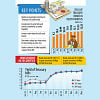Investors flock to risk-free treasury bills for higher returns

Government treasury bills, popularly known as T-bills, have become a lucrative tool to park funds for investors and savers driven by a record spike in yields in recent months.
The yield of all genres of treasury bills has gone past a record 11 percent, way higher than the interest rates of bank deposits as the government's internal borrowing – from financial institutions and individuals – climbed after the suspension of securing loans from the central bank.
During separate auctions on January 29, the government raised Tk 4,098 crore by selling the 91-day treasury bills. The 182-day and 364-day securities fetched Tk 413 crore and Tk 1,357 crore respectively, central bank data showed.
The Bangladesh Bank has suspended printing money for the government since the beginning of the current financial year as high-powered funds stoke inflation, which is already at a record level.
This forced the government to accelerate its borrowing from financial institutions and individuals, making treasury bills an automatic choice for them since the tool is considered lucrative globally for investors looking for a relatively safe place to grow their savings.
Between July 1 and January 25 this fiscal year, the government borrowed Tk 29,353 crore from scheduled banks against treasury bills and bonds and it repaid Tk 31,737 crore to the central bank, BB data showed.
It took around Tk 98,000 crore from the BB in 2022-23, which accounted for 73 percent of its total borrowing from banks and non-banks.
Banks and non-banking financial institutions are also interested in investing in treasury bills and bonds thanks to the higher return and they are a more secure investment than lending.
At the end of FY23, commercial banks invested Tk 301,560 crore in treasury bills and bonds, making up 37 percent of the total investment in the two securities.
The BB parked Tk 130,889 crore and financial institutions invested Tk 948 crore, central bank data showed. Retail investors bought treasury bills and bonds to the tune of Tk 1,102 crore.
A central banker said individual investors are also diverting their funds from banks to treasury bills and bonds for higher returns.
The yield of the 91-day bills stands at 11.35 percent, the 182-day at 11.40 percent and the 364-day at 11.60 percent, up from 6.95 percent, 7.25 percent and 8.30 percent respectively, in June last year.
On the other hand, commercial banks offer 6 to 9 percent interest rates against fixed deposit products, a return that is lower than the 9-plus percent inflation Bangladesh has witnessed since March. The escalated inflation has rendered the return from the deposit schemes largely negative.
"Individual investment in treasury bills and bonds is growing thanks to the interest rate hike," said Emranul Huq, managing director of Dhaka Bank.
This is because both individuals and corporate depositors can receive more than 11 percent interest in just 91 days, he explained. "The rate is higher than the deposit rate at banks."
Since investors are leaning towards treasury bills and bonds, it would be tough to mobilise deposits for banks, according to Syed Mahbubur Rahman, managing director of Mutual Trust Bank.
"Even some depositors are withdrawing funds from banks and are investing in treasury bills since the interest rates against the latter are more than two percentage points higher than the former."
The stock market is yet to become savers' top choice owing to the absence of an adequate number of sound companies listed on the market, rampant manipulation, the dominance of weak companies, and policies that spook investors' confidence.
Who can invest in treasury bills?
Anyone in Bangladesh can easily invest in treasury bills because of the initiatives of the central bank.
At present, treasury bills that mature in 91 days, 182 days and 364 days are up for grabs for residents, which refer to individuals and institutions such as banks, NBFIs and insurance companies.
T-bills are issued through price-based multiple price auctions. Retail investors can buy them from the local offices of the central bank, commercial banks and brokerage houses.
The minimum investment has to be Tk 1 lakh and there is no maximum limit.
As the instruments are issued and backed by the government, the investment in the tools is deemed safe. It is considered risk-free because the government has never defaulted on its debts.
The principal amount and profit, or interest, are paid out on maturity.

 For all latest news, follow The Daily Star's Google News channel.
For all latest news, follow The Daily Star's Google News channel. 




Comments